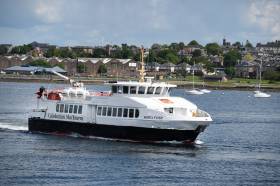Displaying items by tag: Argyll Ferries
A former Aran Islands passenger-only ferry, Argyll Flyer has returned with a new corporate livery following annual dry docking in Scotland to the Gourock-Dunoon route on the Clyde.
Afloat adds the former Queen of Aran II was custom built for Inis Mor Ferries (no longer in existance) and later sold to Aran Island Ferries. The 227 passenger ferry has recently been rebranded as a Caledonian MacBrayne vessel.
According to CalMac the new look sees the iconic black and red livery and follows as Afloat previously reported Argyll Ferries incorporation into the operator's Clyde and Hebrides Ferry Service contract.
As well as a repaint during refit, CalMac say the vessel has had all new upper deck seating installed, new thermal insulation fitted in the passenger saloon, as well as an overhaul to the engine, gearbox, steering, electrics and propellers.
Launched in 2001 at OCEA shipyard at Les Sables-d'Olonne in France, the 178 tonne Queen of Aran II served between the Aran Islands and Rossaveal, Co. Galway and subsequently with Aran Island Ferries before transferring to Argyll Ferries in 2011.
CalMac Ferries managing director, Robbie Drummond said: 'I'm delighted to welcome MV Argyll Flyer back into service in her new livery ready for another busy year. Incorporating this service into the CalMac family will allow us to concentrate efforts on developing service improvements over time to help drive more traffic in support of the Dunoon economy.'
Transport Scotland have indicated improved harbour facilities for passengers will be considered on the route in the future, including the possible introduction of electric vehicle and electric bike hubs at both ferry terminals, as well as developing the ferry service to encourage active travel users.
The other vessel serving the route, MV Alicat, will be rebranded when will undergoe an annual dry dock service later in the year.
Afloat adds that a current Aran Island serving ferry, Glor Na Farraige also operated by Aran Island Ferries went for a refit in Co. Donegal at Mooney Boats boatyard in Killybegs. The work which took place in recent weeks involved shot blasting and painting of the 255 passenger ferry.
Likewise of Arygll Flyer, this ferry was also built in France when launched in 1985 as a 37m metre Wavemaster monohull vessel.
























































